by Sr. Sheila Devane MMM Ireland 13.11.2024
Editor’s Note: Sr. Mary Ellen Sambuco died in September 2024. As a young Sister, she had been missioned in Malawi and you can read her obituary on our website.
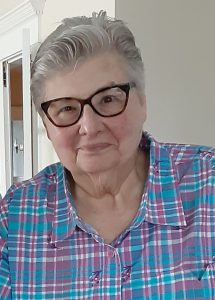 Mary Ellen and I were born in the same year 1945, and each of us was born in one place and moved to another in childhood. We entered MMM the same year 1968, were trained nurses when we joined MMM and as MMMs we both trained as midwives and were first missioned missioned to East Central Africa.
Mary Ellen and I were born in the same year 1945, and each of us was born in one place and moved to another in childhood. We entered MMM the same year 1968, were trained nurses when we joined MMM and as MMMs we both trained as midwives and were first missioned missioned to East Central Africa.
I was the first MMM Mary Ellen met when she came to Ireland – I wish I knew the year exactly but it was winter as you will read; I was sent to the airport to collect her and was supposed to have a companion but at the last minute it was decided as she would have a lot of luggage it would be best if I went alone.
The weather forecast was dreadful by Irish standards: very cold, sleet, light sprinkles of snow, and slippery roads and more to come. At that time, we had no motorways and so I travelled along pretty slowly through the towns of North Dublin to the airport.
While on board the Aer Lingus flight Mary Ellen heard the announcement of seriously bad weather in Ireland, with snow in some places, risky road conditions and a warning to people to only undertake essential travel. Passengers were warned to only travel out of the airport if absolutely necessary. She was reared in Pennsylvania so she had a picture of really bad weather, snow drifts, feet high snow, snow ploughs, cars stuck on highways and much more.
We easily recognised each other in the airport and came outside to cross over to the high-rise car park; I noticed her looking around and taking all in. I paid the parking fee; we got going and headed back on the road home. I believed I was driving on really hazardous roads and felt nervous of skidding or worse for most of the journey.
At about Julianstown Mary Ellen said quietly to me….”We had this announcement on the flight about terrible weather and high-risk road conditions; I thought they were talking about Ireland but I was probably half asleep, thankfully the roads are fine but I see you have a little dusting of snow.”
Well, it’s all about perception isn’t it?! Every time we met afterwards (and we only met a few times) we talked about this journey and laughed heartily.
I offer this memory as a little consolation to the family, friends and MMM community of this lovely woman who first told me, an Irishwoman, about really bad weather!
by Sr. Margaret Anne Meyer MMM USA 10.11.2024
 With the happy memories of our joyous goodbye embraces at Dublin Airport, I began to prepare for my departure for Uganda. I was fitted for lighter clothes in the sewing room and began hemming some new white veils. Sewing name tapes on white stockings and other garments occupied the time I was not praying with the Community or attending teaching sessions in the hospital. I was getting used to this way of life as preparation for finally going to Africa after ten years of training to be useful.
With the happy memories of our joyous goodbye embraces at Dublin Airport, I began to prepare for my departure for Uganda. I was fitted for lighter clothes in the sewing room and began hemming some new white veils. Sewing name tapes on white stockings and other garments occupied the time I was not praying with the Community or attending teaching sessions in the hospital. I was getting used to this way of life as preparation for finally going to Africa after ten years of training to be useful.
Then the news came that the Sisters would like me to study Tropical Medicine because they had a lay doctor from Canada who was not finished his contract and would be there another four months. I was disappointed but this was in our training to be ready for changes in the spirit of Our Blessed Mother, going in haste to visit her cousin, Elizabeth.
Advent was approaching and I looked forward to my second Christmas in Drogheda. A few days before Christmas, I was asked to go to the Communications Department in Bettystown to spend Christmas with the Sisters living in St. Ursula’s. It was a different house than the one there now but just as welcoming. I had never been at the sea at Christmas time, and this was a very memorable time for me. Sr. Catherine who was my first Superior in Rosemount, heartily welcomed me to celebrate Christmas with them. Sr Philomena Doyle and others were there. They all seemed glad of my company and I theirs.
I remember going to bed for a few hours before Midnight Mass which was celebrated in our chapel. When I woke up, I felt I was in a tray of ice cubes in the refrigerator. We dressed quickly and I felt remarkably close to Jesus as he was born in a cold stable. It was an incredibly beautiful experience for all of us. We enjoyed a hot cup of tea and Christmas cake afterwards and returned to bed.
Christmas dinner felt like home, being in a small but loving community. The Sisters were open to having me put on a play of the Light House Keeper’s Daughter which we had put on as novices in Winchester. The Sisters said their parts which I wrote for them and Sister Ann O’Gorman mimed climbing up and down the steps of the lighthouse. There were a lot of laughs, and it brightened the afternoon.
Soon it was time to return to Drogheda. When I reached there, Mother Mary sent for me and said that she wanted to take me to the Nigerian Embassy to get a visa to go to Nigeria. I said “Yes, Mother, but I thought I was going to Liverpool to do Tropical Medicine?” She told me that Sr. Doctor Anne Merriman hurt her back, and I might have to go to Nigeria to relieve her. I said “Yes, Mother” and off we went. The plan was for me to travel with Sr. Doctor Deirdre Twomey to Liverpool and wait for a call to go to Nigeria, if I were needed. That is what we did, but it happened in a different and surprising way.
We had settled in nicely to the Little Sisters of the Poor who had given Deirdre and me hospitality for 12 weeks to do our course when Deirdre received the telephone call from Mother Mary. I had told Deirdre what Mother Mary told me that I may have to leave the course. Deirdre said, “Mother, don’t you mean Sr. Margaret Anne?”, and Mother said, “No dear I mean you.” Sr. Doctor Marcella Duffy is extremely ill, and I want you to go to Nigeria to take her place. We were both flabbergasted. However, Deirdre was on the boat to Dublin, the next day. I missed her very much, but we met up again after 25 years and continued our Twomey-Meyer friendship in Nigeria and beyond I will continue about Tropical Medicine School in another story.
by Nadia Ramoutar MMM Communications Coordinator Ireland 06.11.2024
 For many of us, faith is an important part of our everyday life. We have a rich inner circle of like-minded colleagues and friends who see the world as we do often. We have a consistent practice of prayer, meditation and connection with a greater spiritual world to feed our faith. As we step outside of that comfort zone though, it can be very easy to feel that all is not well in our world.
For many of us, faith is an important part of our everyday life. We have a rich inner circle of like-minded colleagues and friends who see the world as we do often. We have a consistent practice of prayer, meditation and connection with a greater spiritual world to feed our faith. As we step outside of that comfort zone though, it can be very easy to feel that all is not well in our world.
Just a quick glimpse at the nightly news or a conversation with a neighbour and we can be quickly transported into a world where fear and scarcity reign. At times we can look at the way the world appears to be headed, and we can find ourselves concerned, worried or even scared. It is not easy to stay buoyant when so much of the world seems to be on fire or being run by those who value power over people.
On days when darkness seems to creep in, what are we to do? Even the most faithful can feel a twinge of shadows taking hold. The way humans behave, manipulate, act violently and cruelly can overwhelm us if we let us.
Perhaps the most honest thing we can do is to be honest.
The answer is surprisingly simple when faced with a challenge to say, “I would like to do that – but now, I must do this.” To accept that even though we have faith we also have to have acceptance that in our world we are faced with realities that sometimes we just don’t like. Humans often do the wrong thing. We are also dealing with people who do not see the world the way we see it but have some other agenda we cannot fathom. Thankfully. But humans too, can be exceedingly kind and giving.
I reflect at these moments that there is unexpected goodness awaiting us. It is not just bad things going on in the world, but also good things. We have to right-side ourselves and know that the unknown is not all negative. It is a great light that creates shadows and as the light shifts, so do the shadows in size and position. We need to refocus our energy.
“May the God of hope fill you with all joy and peace as you trust in Him, so that you may overflow with hope by the power of the Holy Spirit.” – Romans 15:13
These words bring me comfort as I remind myself to have more trust and to lean further into my “God of Surprises.” I read a book by this title a few years ago and I dip back into it and I remind myself not to allow the shadow to block out my light. I may be misunderstood or frustrated at times, but this is merely a tiny part of something so much greater.
by Mary Essiet Nigeria 03.11.2024
 The other day, I woke up really excited. I had beautiful plans for the day and held my head high as I imagined how gracious it would be. I went through my morning routine and set out to accomplish my goals for the day. Then I checked my mail. Thinking about it now, that wasn’t a good decision, as it drastically changed my mood. I was anticipating an acceptance email from one of the companies I had applied to. But guess what I got instead? A rejection email—you guessed right. The funny thing? They didn’t even use the usual format of appreciating one’s skills and expressing how much they wished they could work with me but couldn’t due to limited vacancies. No, they didn’t. It was an outright “you’ve not been selected.”
The other day, I woke up really excited. I had beautiful plans for the day and held my head high as I imagined how gracious it would be. I went through my morning routine and set out to accomplish my goals for the day. Then I checked my mail. Thinking about it now, that wasn’t a good decision, as it drastically changed my mood. I was anticipating an acceptance email from one of the companies I had applied to. But guess what I got instead? A rejection email—you guessed right. The funny thing? They didn’t even use the usual format of appreciating one’s skills and expressing how much they wished they could work with me but couldn’t due to limited vacancies. No, they didn’t. It was an outright “you’ve not been selected.”
Anyway, I kept hope alive and boarded a taxi to work, only to arrive and realize that I had left an important document in the taxi—probably out of hurry. I reached out to the driver, and he promised to bring it back, but only much later in the day. I could manage since I was only working half a day.
As if that wasn’t enough, I slipped just as I was about to enter the banking hall, and my phone screen cracked badly. I only wanted to resolve an issue with a failed transaction I had over the weekend and maybe withdraw my “urgent 2k” to spoil myself because the day was definitely not going according to plan. How bad could a day be?!
Then, I remembered the popular saying: “happiness is a choice.” I did choose happiness that day, but given everything that had happened, could I keep up with that choice? Wouldn’t that be chaotic, as I’d only end up piling up my feelings for when I could no longer hold back? Well, as happiness wasn’t choosing me, I let myself feel all the emotions of that day but did so patiently and compassionately.
Forgive me for boring you with these details just to say: feel what you feel when you can feel it because happiness may be a choice, but it’s not a simple one. In some circumstances, this choice becomes unhealthy. But imagine if I barged into your room telling you that happiness may not be a choice after all; you’d instinctively begin to argue, and I didn’t want that for either of us. Bear with me, my love. Until next time.
by Nadia Ramoutar MMM Communications Coordinator Ireland 30.10.2024
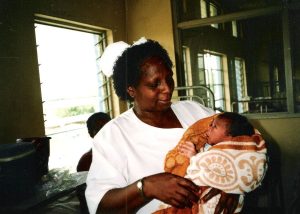 Recently I was asked to speak on a Webinar about the MMM efforts for a Safe Birth 4 All campaign to make childbirth safer for women in Sub-Saharan Africa. I am very grateful to be involved in efforts to see the dangerous elements of death or injury in birthing be eased for all women, not just women in the Global North. I often say that geography dictating destiny is a sign of injustice. I say it so often that I am almost tired of hearing myself. But we have to keep sharing the stories of the women who don’t get to have a voice for themselves.
Recently I was asked to speak on a Webinar about the MMM efforts for a Safe Birth 4 All campaign to make childbirth safer for women in Sub-Saharan Africa. I am very grateful to be involved in efforts to see the dangerous elements of death or injury in birthing be eased for all women, not just women in the Global North. I often say that geography dictating destiny is a sign of injustice. I say it so often that I am almost tired of hearing myself. But we have to keep sharing the stories of the women who don’t get to have a voice for themselves.
During the Webinar, another presenter spoke about the challenges of her role trying to educate girls in South Sudan. Her first-hand account of what she saw and experienced there was horrifying. I feel not enough people know enough about it – including me. When we look at the high numbers of injured or dying females giving birth, many are young, and their bodies are not capable of a safe unattended birth. But this is a causation that seems to go culturally noticed.
The presenter said that girls were used like cows as currency. Any male family member from the extended family had rights over the girl and could remove her from school to have her married. She never earned agency over her own body or education. Not even at 18.
According to Concern, the Irish NGO, there is a dire situation for females in South Sudan. Gendered Based Violence is the number one health risk for women and girls there. We may not think of it this way, but gendered violence includes forced or early marriage and happens for nearly half of all South Sudanese girls. Current statistics show that 45% of girls were married before their 18th birthday. For 7%, their marriage took place before they turned 15. Look around you and see teenage girls and imagine them being forced into a marriage.
Perhaps it is no surprise then that South Sudan has the fifth highest maternal mortality rate in the world: 1 in 7 women will die due to complications during pregnancy or childbirth. I want to pause here and think about what would happen if one of every seven women in New York or London or Toronto died in childbirth. Can you imagine?
The reasons for these high death rates are complex and based in many traditions do not serve the female population. The politics of the area don’t help. This is largely due to an infrastructure crippled by nearly a decade of conflict, which has led to an underdeveloped healthcare system and a severe shortage of skilled healthcare workers — especially for obstetrics and gynaecology.
We just cannot forget about these girls. We must continue to provide resources and awareness about these issues. I for one find this heartbreaking. I will not allow myself to just forget about these sisters overseas facing brutal odds with no options.
by Sr. Sheila Campbell MMM Ireland 27.10.2024
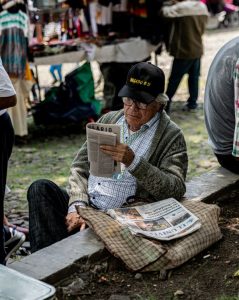 Each day I wake up listening to the radio. News bulletins come on each 30 minutes and then there are the longer programmes where the day’s happenings are gone over in more detail. Aren’t there times when you wish you could stick your head in the sand and forget all about the atrocities going on in our world?
Each day I wake up listening to the radio. News bulletins come on each 30 minutes and then there are the longer programmes where the day’s happenings are gone over in more detail. Aren’t there times when you wish you could stick your head in the sand and forget all about the atrocities going on in our world?
I remember during “The Troubles” in Northern Ireland my parents in Belfast became news junkies too. I wonder does it really help to be so addicted to this living vicariously the tragedies of others. How do we draw the balance? How do we be present to the reality of our times without being overwhelmed by it? I wish I had an easy answer.
For me, one thing that helps is going back to our Benedictine spirituality. St. Benedict founded his monasteries in a time of civil turmoil too. The Benedictine motto of “Peace” and the emphasis on stability helps ground me when the going gets tough.
The Rule encourages us to develop the following qualities – humility, patience, simplicity, solitude, caring for others, and living in community – concern for everyone. It is a recipe for a simple, balanced and prayerful life. We do not cut ourselves off from our society, but we are not swallowed up by it too.
I also remind myself that there is a lot of good things happening too – but they do not hit the headlines. We all know people who visit the sick and the lonely, care for elderly relatives, volunteer in food banks and charity shops. Then there are the fund-raisers for charitable causes, the people who work quietly behind the scenes – we all know them.
So today, when tragic events are occurring, let’s stop for a moment and remember all the simple quiet ways people promote peace and good will among their fellow human beings. Let us say “yes” to collaborating in this quiet way and be ambassadors of peace in our troubled world.
by Sr. Jo Anne Kelly MMM Ireland 23.10.2024
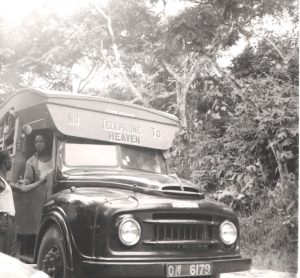 Recently I watched a webinar on the campaign to raise awareness about Obstetric Vistula and the awful effect it has on so many women in the world, causing them loss of dignity and forcing them to live in isolation – as outcasts.
Recently I watched a webinar on the campaign to raise awareness about Obstetric Vistula and the awful effect it has on so many women in the world, causing them loss of dignity and forcing them to live in isolation – as outcasts.
That webinar reminded me about many women I knew but especially about Eliza.
For some years I lived with Sr. Dr. Ann Ward who pioneered special techniques for surgical repair of obstetric fistula. Women came from far and near for the surgery. These women were very slow to make themselves known or to come out publicly.
One of our MMM Sisters, Winnie, in a distant mission, set up a plan for her area. She engaged people around the area to seek out the women and encourage them to come to her for help. The women started coming bit by bit as news went around.
Every three weeks Winnie, with a faithful driver, Augustine, made the trip in a minibus to the Family Life Centre where Sr. Ann worked, bringing with them the women who had agreed to come in. Winnie would stay overnight and next day take home the women of the previous trip who now had the surgery and were going home free.
Eliza was one of these women. Sr. Ann always said that every case was different. Eliza was different because she had an added complication and was not ready to go home with her group. She needed another week.
My own work took me to many parts of the country and it happened I was going in Eliza’s direction just over a week later. I offered to bring her home. I went to visit her a few times during the week, just so I wasn’t a complete stranger to her. Although she joined in the activities and social gatherings of the centre she was apprehensive. She was missing her group especially as she did not understand the local language. She had been to primary school and had quite good English. Having lived in more or less isolation for years, every new thing was a big adjustment, including going home and in a car.
hen, she would forget all of that and remember the one big, big thing that had happened – she was healed. She was quite ecstatic about that. She would throw up her arms, praise and thank God, praise and thank Dr. Ward and everybody else in the compound. One could not but rejoice with her then.
We set off early in the morning. She was quiet. I glanced round a few times. She was staring out, watching everything. I explained to her we were going home the way she had come. She said “I saw nothing when I was coming” Now she started seeing everything, houses, trees, children going to school, goats straying on the road, women with market stalls, fruit, bunches of bananas and plantain, naming everything she saw. Every now and again her hands would go up thanking God for it all. It was as if the world had opened up for her.
On the motorway there was little to see except road. I had a cassette player. Though my choice of music could not have been hers she sang along with everything, even the Irish tenors.
Nearing her area, I asked about her home and she told me we had passed the road to her home. I was stopping to turn back. She said No! No! I must first go and thank Sr. Winnie. I will find my way back. We saw Winnie, and she was well thanked.
I brought her home. Her village was miles off the main road. She was quiet then as she gave me directions and I knew this was a very big test for her. We stopped outside a little mud house. She made some kind of call. After some time a little old lady came out on her stick and whatever words Eliza said to her, her face changed, her old eyes lit up and the two women embraced and talked and hugged again and again.
As I was saying goodbye, the little old lady took my hand and started praying in her language.
Eliza said “My mother has given you her blessing.”
by Sr. Noeleen Mooney MMM Ireland 20.10.2024
 This year, 2024, marks the fifteen hundredth anniversary of the death of Saint Brigid – a mid-boggling fact.
This year, 2024, marks the fifteen hundredth anniversary of the death of Saint Brigid – a mid-boggling fact.
As a native of Kildare, I decided to make my annual retreat in Solas Bhride Christian Spirituality Centre, run by the Brigidine Sisters in Kildare town. In coming apart, I hoped to re-ignite in myself some of the flame which Brigid kindled, and which is very much alive in this place of prayer.
i stayed in one of the three hermitages on the grounds and self-catered with all the facilities provided. The grounds are very nature-friendly and as I ate my breakfast, I watched the rabbits outside my window nibbling theirs!
Also on the grounds is a labyrinth – ideal for slow meditation, a mini oak grove, formed from saplings planted in 2007 from the original oak tree in Tullow which was planted at the founding of the Brigidine Sisters in 1807.
The Centre itself is built in the shape of a St. Brigid’s Cross and is available to individuals and groups for all kinds of gatherings connected to the legacy of St. Brigid – spirituality, peace-making, care of creation, advocacy for the poor, and legendary hospitality, wonderfully carried out by the present Sisters and staff. St. Brigid’s flame is being tended in the Centre since it was re-lit in Kildare town in 1993 and burns as a beacon of hope, justice and peace for our world.
I visited the two St. Brigid’s wells nearby – one beside the National Stud – and was drawn into the mystery and call of holy wells. Daily Mass was celebrated in St. Brigid’s parish church, a fifteen-minute walk from the Centre, or in White Abbey, home of the Carmelite Fathers.
As a place of peace, solitude and prayer, I highly recommend it!
by Sr. Keresifon Ekanem MMM Nigeria 16.10.2024
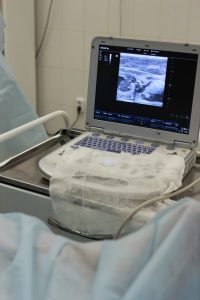 Oh dear! I felt frustrated when I received the news that the supervision team from the Ministry of Health (MOH) to our Facility had asked me to stop practicing as a Nurse/Midwife in my first country of mission for some reasons about country policy. So, I won’t meet the pregnant women again, and will stop catching babies? I will really miss this!
Oh dear! I felt frustrated when I received the news that the supervision team from the Ministry of Health (MOH) to our Facility had asked me to stop practicing as a Nurse/Midwife in my first country of mission for some reasons about country policy. So, I won’t meet the pregnant women again, and will stop catching babies? I will really miss this!
Not to worry, a thought flashed into my mind, “You will meet them when they come for antenatal care and the mothers when they come for immunization.” Great! I will have more time now to give health talk to them. I will also go for more sensitization and outreach in the neighboring villages as well as do other tasks. Sure, I did!
Meanwhile, there was a need for a sonographer in our Ministry and a suggestion to delve into this field emerged. I grabbed it. Thanks to my community members, and leaders who recommended and approved it. The experience was great, and I am excited with this new skill. The fear of studying in a foreign language and the struggle was soon forgotten.
Remember my initial feeling? Frustration! What followed that was really fantastic! I met more pregnant women on daily basis and was in contact with babies even from their different stages of development in the womb. A very interesting experience! This experience reveals at every moment the awesomeness of God in His work which is beyond human comprehension. God is great, worthy of our praise and reverence. I feel excited about my new knowledge, and I am passionate about my work as I put this skill into use. It offers me an opportunity to still give full attention to mothers and children and care for them. This happens each day as I attend to mothers to check for the movements, heartbeats, sex, presentation, and the general well-being of their fetuses in the womb.
I see a deep connection it has with the dream of Mother Mary Martin, our Foundress, whose primary aim of founding the Congregation is the “Care for Mother and Child.” Meanwhile, it also offers an opportunity to share a message of hope and bring Christ to those whose reports do not meet their expectations. These expectations range from non-existence of pregnancy for those who assume they are pregnant, loss of a pregnancy (miscarriage), or not having the desired sex of their fetus. Rendering my services to these women is healing both to themselves and to their spouses who when they learn of the care and attention they receive also long to come and most importantly for them to see how their fetuses (babies) are doing in the womb. This gives them so much joy! Nevertheless, I now have the opportunity to use all my skills in my new mission and it is very valuable!
Really, “A blessing in disguise it was!”
by Sr. Margaret Anne Meyer MMM USA 13.10.2024
 (continued from previous blog)
(continued from previous blog)
About three months into my surgical rotation, I received the news that I had to leave it and prepare to go to Uganda. I was shocked as well as pleased to be going on the missions to Uganda. Mr. Sheehan told me I would regret it. I was trying to follow what I had been told.
My parents wanted to see me before I left for Uganda but unfortunately my mother’ s brother died, and my father came with my brother, David, whom I had not seen for seven years. He was a boy of fourteen at a level with my shoulders when I left USA, and now he was a very handsome man of twenty-one, his six feet towering over me. I hardly recognized him. I was so extremely glad to see him. He showed me pictures of the beautiful woman, Judy, whom he intended to marry. Daddy liked her too. David stayed with the valet of Mother Mary’s brother and my Father stayed in the Guest Department. When it was time for David to leave, the kind valet packed his dirty clothes so well that the customs man in Kennedy airport thought he had bought new clothes in Ireland and wanted him to pay a fee. He had a tough time convincing him that these were his dirty clothes.
Mr. Sheehan, Dr. Connolly and their wives had been to a conference in Brooklyn, New York, a few months previously and my father had met them at Kennedy Airport and invited them home for dinner. They knew my father and invited him to their homes too. Dr. Marie Sheehan even gave my father the use of her car while he was visiting me.
I still had a few days of my rotation to finish but had time to show my father and David around the hospital. David and I had our picture taken on the roof where the Statue of the Visitation was placed. I could not get over how handsome he was and have treasured that picture.
We all had an enjoyable time together. We visited some od Dad’s friends at work who had retired in various places in Ireland. M We also visited Dublin, and I took him to see Miss Dowling, whom we visited in the Royal Home for the Incurables. She was a longtime friend of Sr. Magdalen O’Rourke. She was delighted to see us both. My father kissed her on the cheek, and this impressed her very much. She told me so when she sent me a Mass card six months later when she found out my father had died of a heart attack.
At that time, I was unaware that this may be the last time I would see Daddy alive, but he knew; as he told Sr. Mary O’Neill, who served him his meals in the Guest Department, that he would never see me again. She told me this in 1970 when I visited Drogheda on my first home leave from Uganda. But that is another story.
